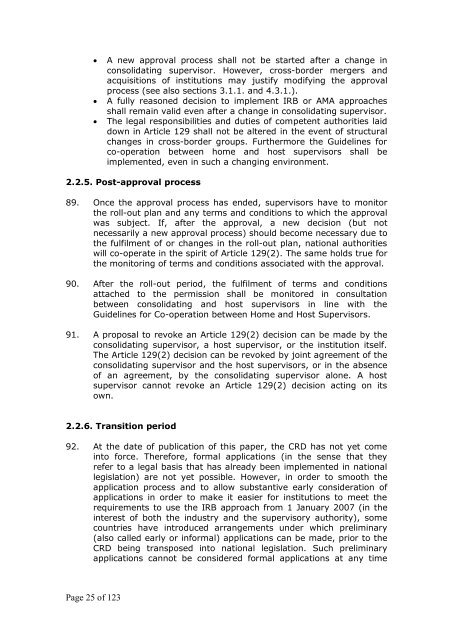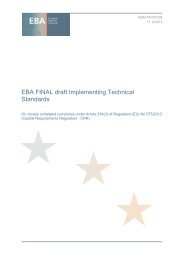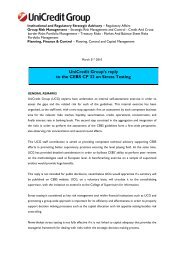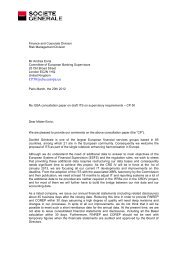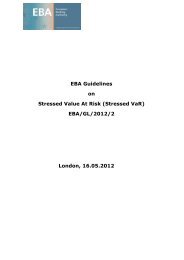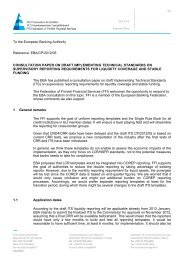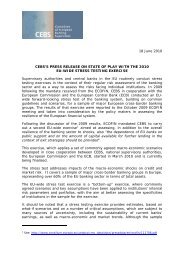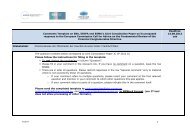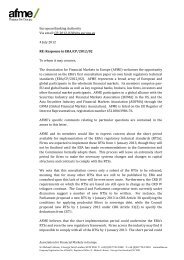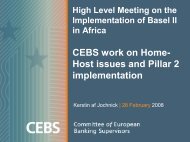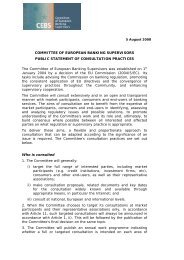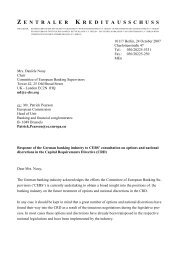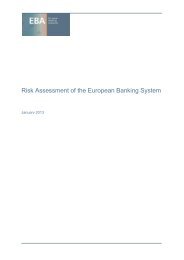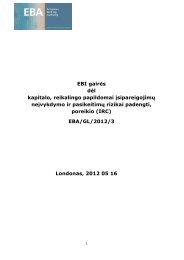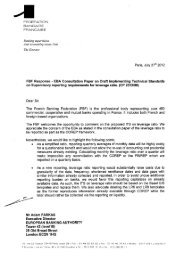CP10 (Full Document) - European Banking Authority
CP10 (Full Document) - European Banking Authority
CP10 (Full Document) - European Banking Authority
You also want an ePaper? Increase the reach of your titles
YUMPU automatically turns print PDFs into web optimized ePapers that Google loves.
· A new approval process shall not be started after a change in<br />
consolidating supervisor. However, crossborder mergers and<br />
acquisitions of institutions may justify modifying the approval<br />
process (see also sections 3.1.1. and 4.3.1.).<br />
· A fully reasoned decision to implement IRB or AMA approaches<br />
shall remain valid even after a change in consolidating supervisor.<br />
· The legal responsibilities and duties of competent authorities laid<br />
down in Article 129 shall not be altered in the event of structural<br />
changes in crossborder groups. Furthermore the Guidelines for<br />
cooperation between home and host supervisors shall be<br />
implemented, even in such a changing environment.<br />
2.2.5. Postapproval process<br />
89. Once the approval process has ended, supervisors have to monitor<br />
the rollout plan and any terms and conditions to which the approval<br />
was subject. If, after the approval, a new decision (but not<br />
necessarily a new approval process) should become necessary due to<br />
the fulfilment of or changes in the rollout plan, national authorities<br />
will cooperate in the spirit of Article 129(2). The same holds true for<br />
the monitoring of terms and conditions associated with the approval.<br />
90. After the rollout period, the fulfilment of terms and conditions<br />
attached to the permission shall be monitored in consultation<br />
between consolidating and host supervisors in line with the<br />
Guidelines for Cooperation between Home and Host Supervisors.<br />
91. A proposal to revoke an Article 129(2) decision can be made by the<br />
consolidating supervisor, a host supervisor, or the institution itself.<br />
The Article 129(2) decision can be revoked by joint agreement of the<br />
consolidating supervisor and the host supervisors, or in the absence<br />
of an agreement, by the consolidating supervisor alone. A host<br />
supervisor cannot revoke an Article 129(2) decision acting on its<br />
own.<br />
2.2.6. Transition period<br />
92. At the date of publication of this paper, the CRD has not yet come<br />
into force. Therefore, formal applications (in the sense that they<br />
refer to a legal basis that has already been implemented in national<br />
legislation) are not yet possible. However, in order to smooth the<br />
application process and to allow substantive early consideration of<br />
applications in order to make it easier for institutions to meet the<br />
requirements to use the IRB approach from 1 January 2007 (in the<br />
interest of both the industry and the supervisory authority), some<br />
countries have introduced arrangements under which preliminary<br />
(also called early or informal) applications can be made, prior to the<br />
CRD being transposed into national legislation. Such preliminary<br />
applications cannot be considered formal applications at any time<br />
Page 25 of 123


